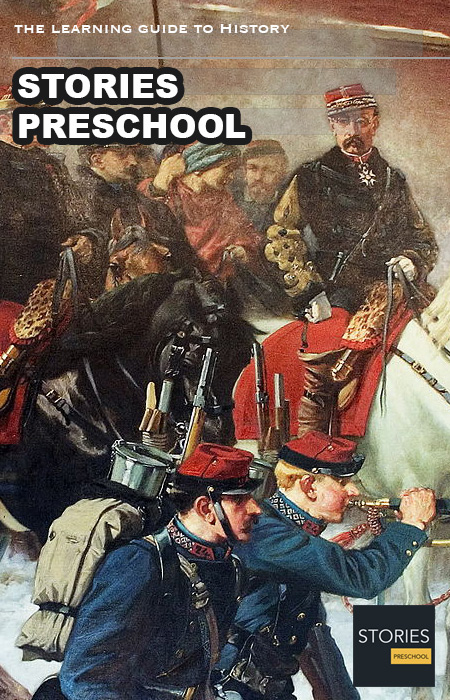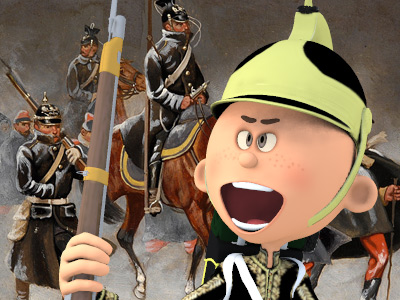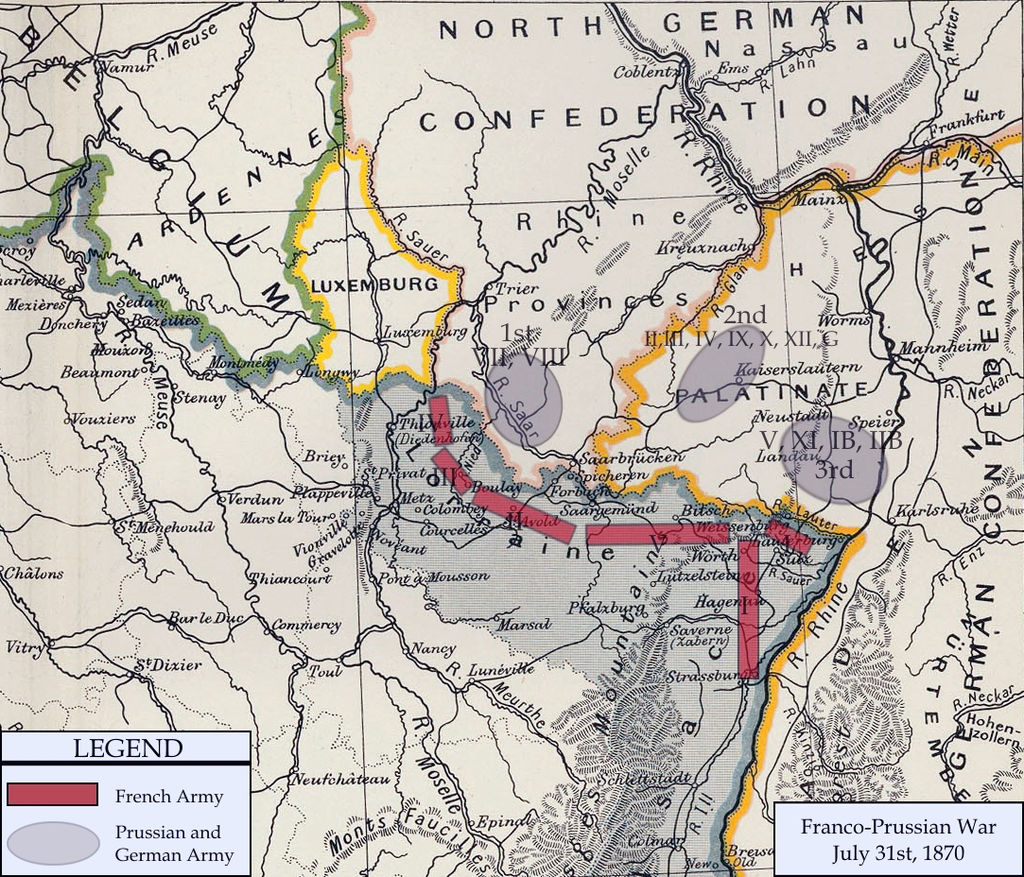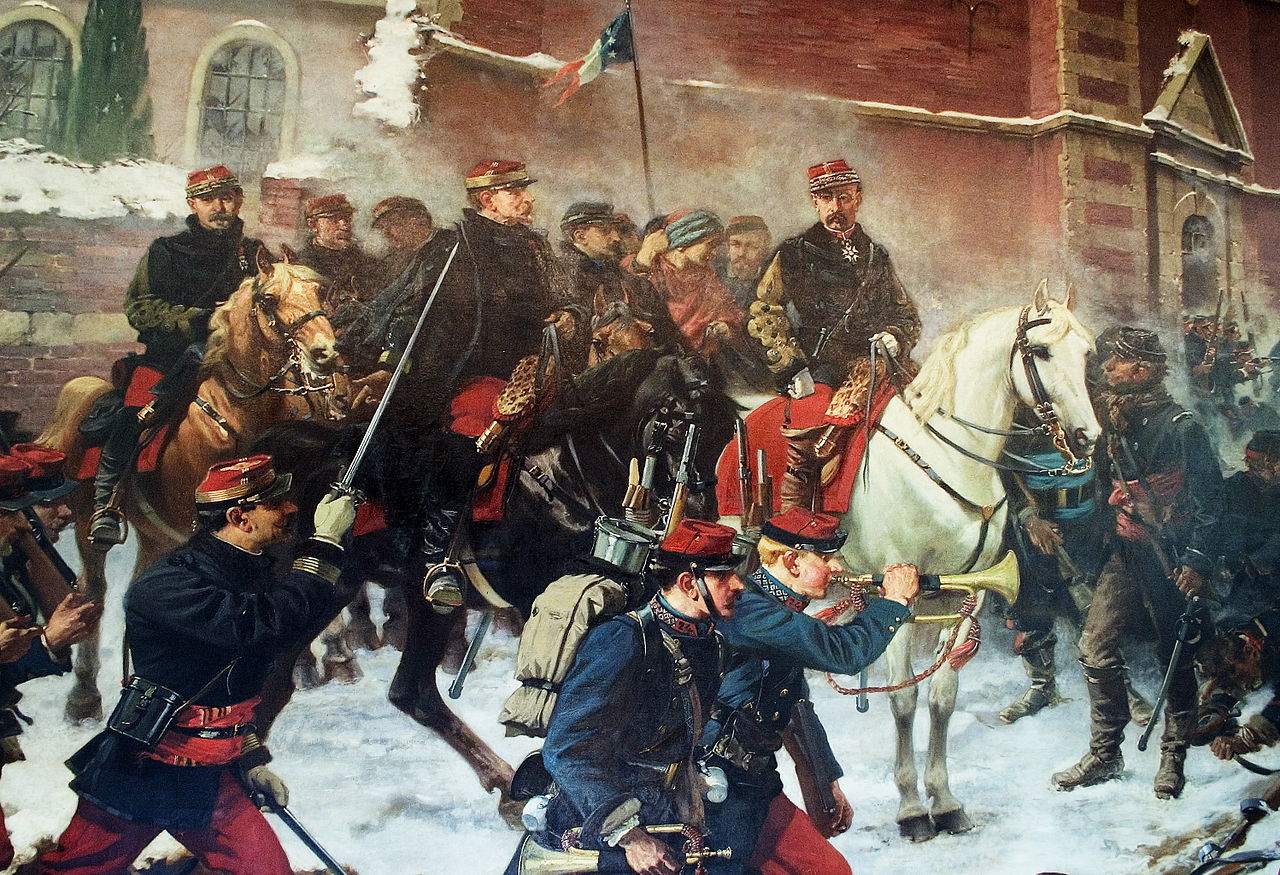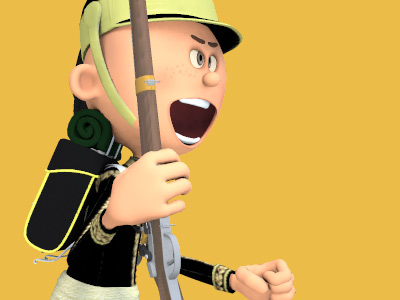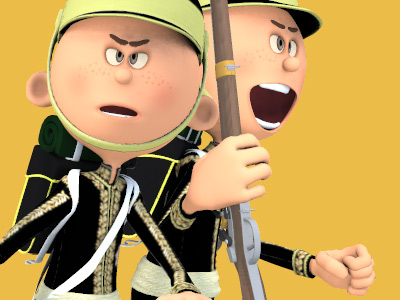Franco-Prussian War (1870 to 1871)
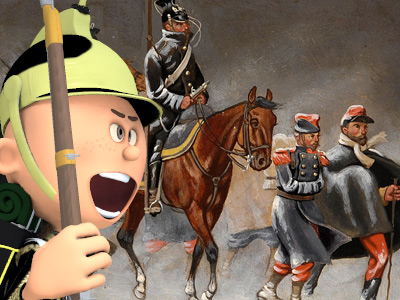
The Franco-Prussian War or Franco-German War, often referred to in France as the War of 1870 (19 July 1870 – 10 May 1871), was a conflict between the Second French Empire Second French Empire was the 18-year Imperial Bonapartist regime of Napoleon III from 14 January 1852 to 27 October 1870. The Second Empire is given high credit for the rebuilding of Paris with broad boulevards, striking public buildings, and elegant residential districts for upscale Parisians. In international policy, Napoleon III tried to emulate his uncle Napoleon I, engaging in numerous imperial ventures around the world as well as several wars in Europe. of Napoleon III and the German states of the North German Confederation led by the Kingdom of Prussia. The conflict was caused by Prussian ambitions to extend German unification and French fears of the shift in the European balance of power that would result if the Prussians succeeded.
Second French Empire was the 18-year Imperial Bonapartist regime of Napoleon III from 14 January 1852 to 27 October 1870. The Second Empire is given high credit for the rebuilding of Paris with broad boulevards, striking public buildings, and elegant residential districts for upscale Parisians. In international policy, Napoleon III tried to emulate his uncle Napoleon I, engaging in numerous imperial ventures around the world as well as several wars in Europe. of Napoleon III and the German states of the North German Confederation led by the Kingdom of Prussia. The conflict was caused by Prussian ambitions to extend German unification and French fears of the shift in the European balance of power that would result if the Prussians succeeded.
Some historians argue that the Prussian chancellor Otto von Bismarck deliberately provoked a French attack in order to draw the independent southern German states—Baden, Württemberg, Bavaria and Hesse-Darmstadt—into an alliance with the North German Confederation dominated by Prussia, while others contend that Bismarck did not plan anything and merely exploited the circumstances as they unfolded.
On 16 July 1870, the French parliament voted to declare war on the German Kingdom of Prussia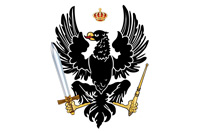 The Kingdom of Prussia was a German kingdom that constituted the state of Prussia between 1701 and 1918. It was the driving force behind the unification of Germany in 1871 and was the leading state of the German Empire until its dissolution in 1918. Although it took its name from the region called Prussia, it was based in the Margraviate of Brandenburg. Its capital was Berlin. and hostilities began three days later. The German coalition mobilised its troops much more quickly than the French and rapidly invaded northeastern France. The German forces were superior in numbers, had better training and leadership and made more effective use of modern technology, particularly railroads and artillery.
The Kingdom of Prussia was a German kingdom that constituted the state of Prussia between 1701 and 1918. It was the driving force behind the unification of Germany in 1871 and was the leading state of the German Empire until its dissolution in 1918. Although it took its name from the region called Prussia, it was based in the Margraviate of Brandenburg. Its capital was Berlin. and hostilities began three days later. The German coalition mobilised its troops much more quickly than the French and rapidly invaded northeastern France. The German forces were superior in numbers, had better training and leadership and made more effective use of modern technology, particularly railroads and artillery.
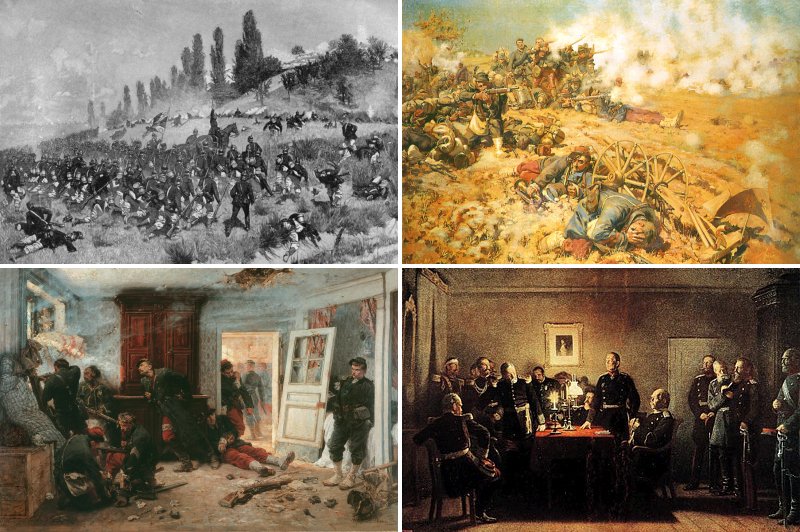
Collage of the Franco-Prussian war

Collage of the Franco-Prussian war
( Click image to enlarge)
A series of swift Prussian and German victories in eastern France, culminating in the Siege of Metz and the Battle of Sedan, saw Napoleon III captured and the army of the Second Empire decisively defeated. A Government of National Defence declared the Third Republic French Third Republic was the system of government adopted in France from 4 September 1870, when the Second French Empire collapsed during the Franco-Prussian War, until 10 July 1940, after the Fall of France during World War II led to the formation of the Vichy government. During the 19th and 20th centuries, the French colonial empire was the second largest colonial empire in the world only behind the British Empire. in Paris on 4 September and continued the war for another five months; the German forces fought and defeated new French armies in northern France. Following the Siege of Paris, the capital fell on 28 January 1871, and then a revolutionary uprising called the Paris Commune seized power in the capital and held it for two months, until it was bloodily suppressed by the regular French army at the end of May 1871.
French Third Republic was the system of government adopted in France from 4 September 1870, when the Second French Empire collapsed during the Franco-Prussian War, until 10 July 1940, after the Fall of France during World War II led to the formation of the Vichy government. During the 19th and 20th centuries, the French colonial empire was the second largest colonial empire in the world only behind the British Empire. in Paris on 4 September and continued the war for another five months; the German forces fought and defeated new French armies in northern France. Following the Siege of Paris, the capital fell on 28 January 1871, and then a revolutionary uprising called the Paris Commune seized power in the capital and held it for two months, until it was bloodily suppressed by the regular French army at the end of May 1871.
The German states proclaimed their union as the German Empire under the Prussian king Wilhelm I, uniting Germany as a nation-state. The Treaty of Frankfurt of 10 May 1871 gave Germany most of Alsace and some parts of Lorraine, which became the Imperial territory of Alsace-Lorraine (Reichsland Elsaß-Lothringen). The German conquest of France and the unification of Germany upset the European balance of power that had existed since the Congress of Vienna in 1815, and Otto von Bismarck maintained great authority in international affairs for two decades. French determination to regain Alsace-Lorraine and fear of another Franco-German war, along with British apprehension about the balance of power, became factors in the causes of World War I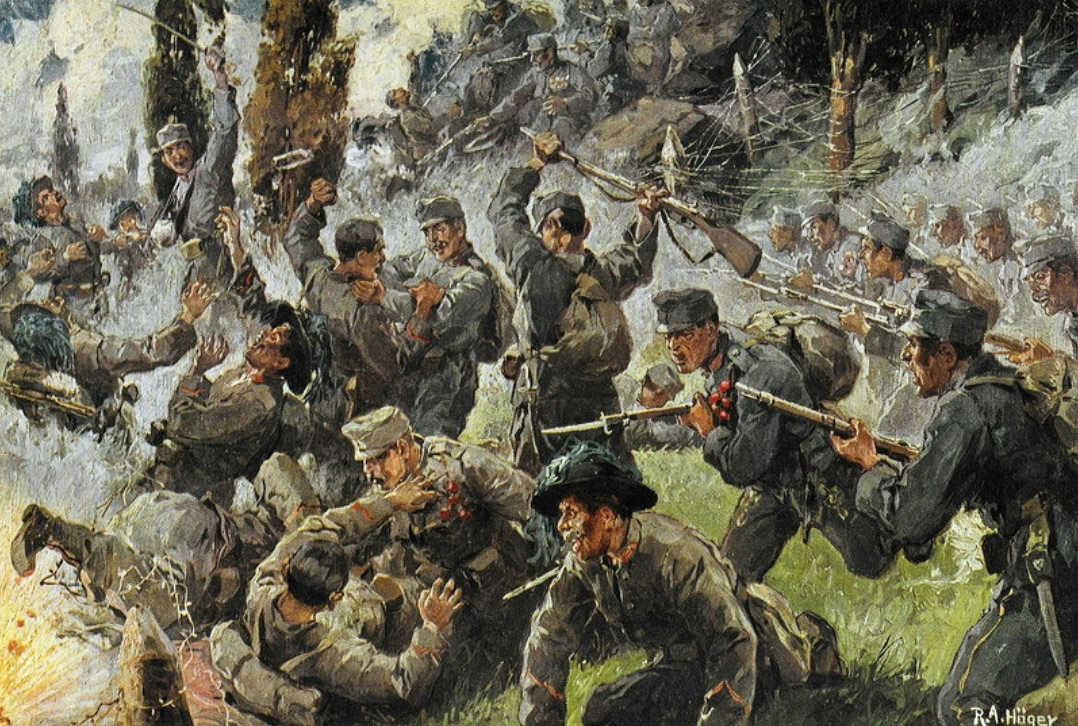 World War I, also known as the First World War, or the Great War, was a global war originating in Europe that lasted from 28 July 1914 to 11 November 1918. More than 70 million military personnel, including 60 million Europeans, were mobilized in one of the largest wars in history. The war drew in all the world's economic great powers, assembled in two opposing alliances: the Allies versus the Central Powers of Germany and Austria-Hungary. View World War I ».
World War I, also known as the First World War, or the Great War, was a global war originating in Europe that lasted from 28 July 1914 to 11 November 1918. More than 70 million military personnel, including 60 million Europeans, were mobilized in one of the largest wars in history. The war drew in all the world's economic great powers, assembled in two opposing alliances: the Allies versus the Central Powers of Germany and Austria-Hungary. View World War I ».
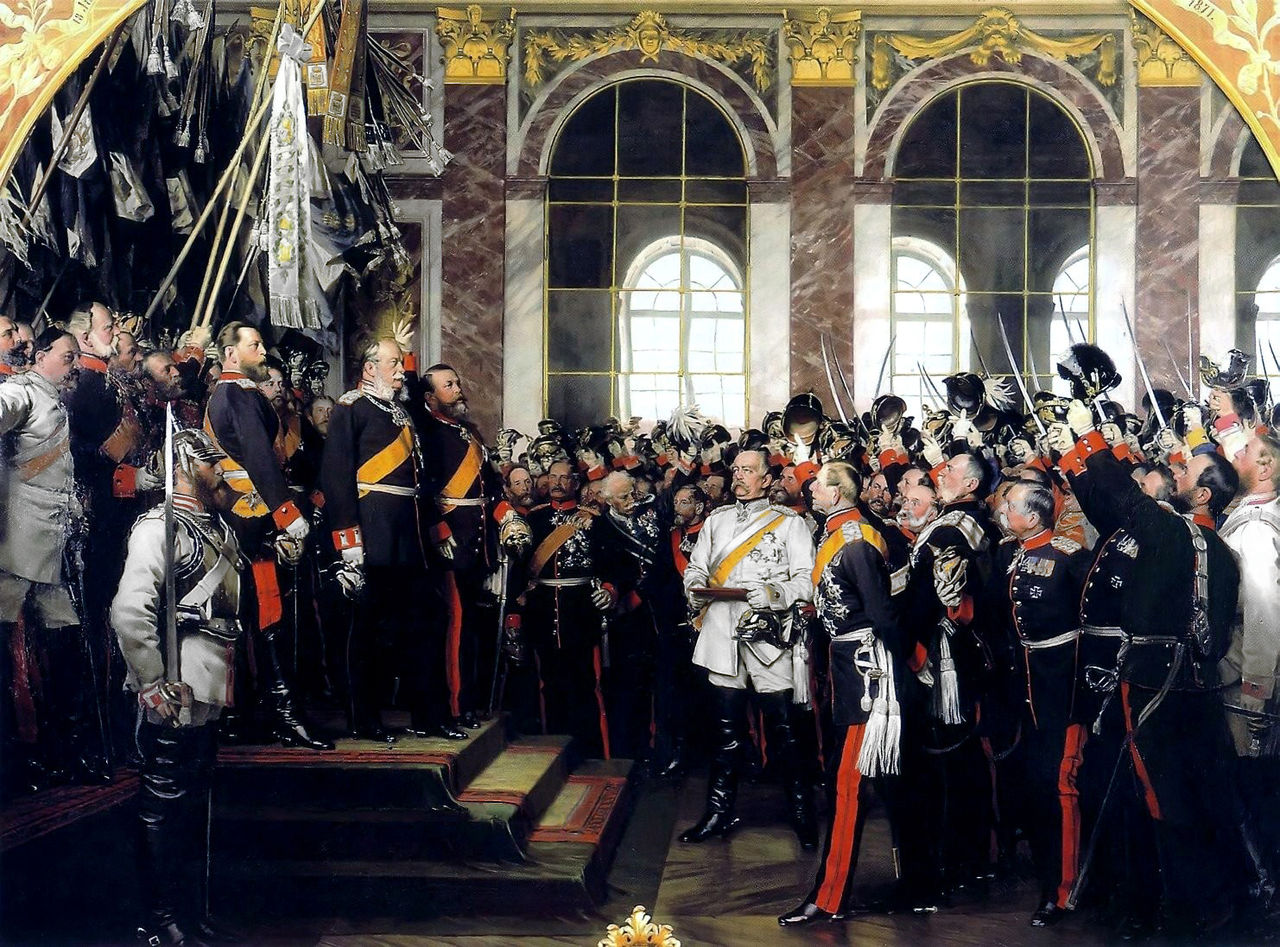
Proclamation of the German Empire, painted by Anton von Werner

Proclamation of the German Empire, painted by Anton von Werner
( Click image to enlarge)
HISTORY
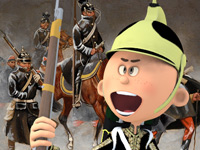
RESOURCES
This article uses material from the Wikipedia article "Franco-Prussian War", which is released under the Creative Commons Attribution-Share-Alike License 3.0.
© Stories Preschool. All Rights Reserved.
